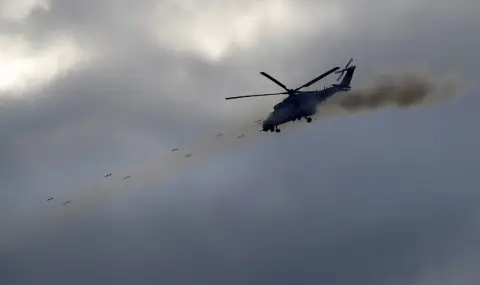Russian forces have made tactical progress in the northwest from Avdeevka near Arkhangelsk on the night of May 3-4. It comes presumably after Ukraine's decision to withdraw from the region on May 3.
A Russian blogger published footage on May 4 showing elements of the Russian "Avalanche" battalion of the 132nd Motorized Rifle Brigade (1st Army Corps of the Donetsk People's Republic (DPR) raise a flag in Arkhangelsk.
Additional geolocation footage released on May 4 shows that Russian forces have advanced in the area.
The Institute for the Study of War (ISW) commented on this.
ISW estimates that the Russian takeover indicates that they probably control Keramik and Novokalinov (both southeast of Arkhangelsk). Geolocated footage released on May 3 shows the withdrawal of Ukrainian forces from northern Arkhangelsk. Russian bloggers claim that Russian forces advanced into the settlement on the night of May 3-4 after the Ukrainian withdrawal.
A well-known Russian blogger claims that Russian forces have conducted offensive operations in several stages. They advanced from Ocheretino (northwest of Avdeevka and southwest of Arkhangelske) a week ago, and from Keramik (east of Ocheretino) they captured the settlement on May 3.
Ukrainian forces may have decided to trade space for time as they wait for US aid to arrive on the front lines in the coming weeks. This is an appropriate solution when there is insufficient resource at risk of being overwhelmed.
ISW continues to assess that Russian forces are likely trying to take advantage of the limited window of time before the arrival of Western military aid supplies. They may make further tactical advances in this area in the near future.
Russian forces have already committed approximately one division's worth of combat power (consisting mainly of four brigades of the Central Military District to the front line northwest of Avdeyevka and are reportedly continuing to bring additional forces into this general area.
The Kremlin continues to make efforts to portray its unprovoked war of aggression against Ukraine as something other than what it is, while continuing to assert the jurisdiction of Russian federal law over sovereign states. Russian state media reported on May 4 that Russia's Ministry of Internal Affairs (MIA) had placed Ukrainian President Volodymyr Zelensky, Ukrainian Ground Forces Commander Lt. Gen. Oleksandr Pavlyuk, and former Ukrainian President Petro Poroshenko on Russia's most wanted list and opened criminal cases against the three Ukrainian leaders.
Russian state media noted that the Russian Ministry of Internal Affairs did not specify the crimes of Zelensky, Pavlyuk or Poroshenko, nor the alleged crimes of previous Ukrainian officials that Russia has put on its wanted list, including the head of the Main Directorate of Ukrainian military intelligence ( GUR) Lieutenant General Kyrylo Budanov and the head of the State Security Service of Ukraine (SBU) Vasyl Malyuk. One Russian blogger expressed hope that Zelensky's arrest warrant would prevent him from visiting countries with extradition treaties with Russia.
Ukraine's Ministry of Foreign Affairs (MFA) called the arrest warrants an act of Russian propaganda.
Ukrainian officials have recently warned that the Kremlin is stepping up an existing information operation called "Maidan 3", aimed at creating doubt about the legitimacy of Zelensky's presidency among Ukrainians, and that "Maidan 3" likely to peak around the end of May 2024.
The Kremlin's decision to place Zelensky, Pavlyuk and Poroshenko on Russia's wanted list is likely part of the Russian information operation "Maidan 3". and from the Kremlin's wider efforts to discredit the current and previous pro-Western Ukrainian governments following Ukraine's 2014 Euromaidan revolution, as well as to isolate Ukraine diplomatically.
The Kremlin's decision to place Ukrainian officials on Russia's wanted list is also an aspect of its ongoing efforts to enforce laws in sovereign European and post-Soviet countries where it has no legal jurisdiction. The Russian Ministry of Internal Affairs previously placed numerous officials from NATO member states - including Estonia, Latvia and Lithuania - on Russia's wanted list for allegedly violating various Russian federal laws in NATO member states.
ISW continues to assess that the Kremlin's efforts to assert Russia's jurisdiction are to create informational conditions justifying possible future Russian aggression against NATO countries.
Russian law enforcement authorities raided supporters of jailed Russian ultranationalist and former officer Igor Girkin (aka Strelkov) in the Tula region on May 4, possibly in an attempt to create informational conditions for a travel ban in Russia. Russian law enforcement officials, including Federal Security Service (FSB) officials, reportedly raided the branch of the Russian Strelkov (Girkin) Movement (RDS) in the Tula Region on May 4.
Russian law enforcement officials searched its branch in Tula region for members of the all-Russian pro-Ukrainian Russian Volunteer Corps (RDK), who were recently found guilty by a local court of writing the slogan "Freedom for Strelkov". a pile of waste in Novomoskovsk, Tula Region on April 29.
Russian Telegram channel, which published internal information from law enforcement agencies, reported that Russian law enforcement officials searched at least three members of the RDS and detained Alexander Omelchenko. They later released him, but confiscated his phone.
The RDS has suggested that Russian law enforcement officials are deliberately trying to discredit and ban the movement by claiming it is affiliated with the RDC, which the Russian government has designated as a terrorist organization. Russian President Vladimir Putin recently met with Tula Oblast Governor Alexei Dyumin on May 2, but it is unclear whether the two events are connected.
